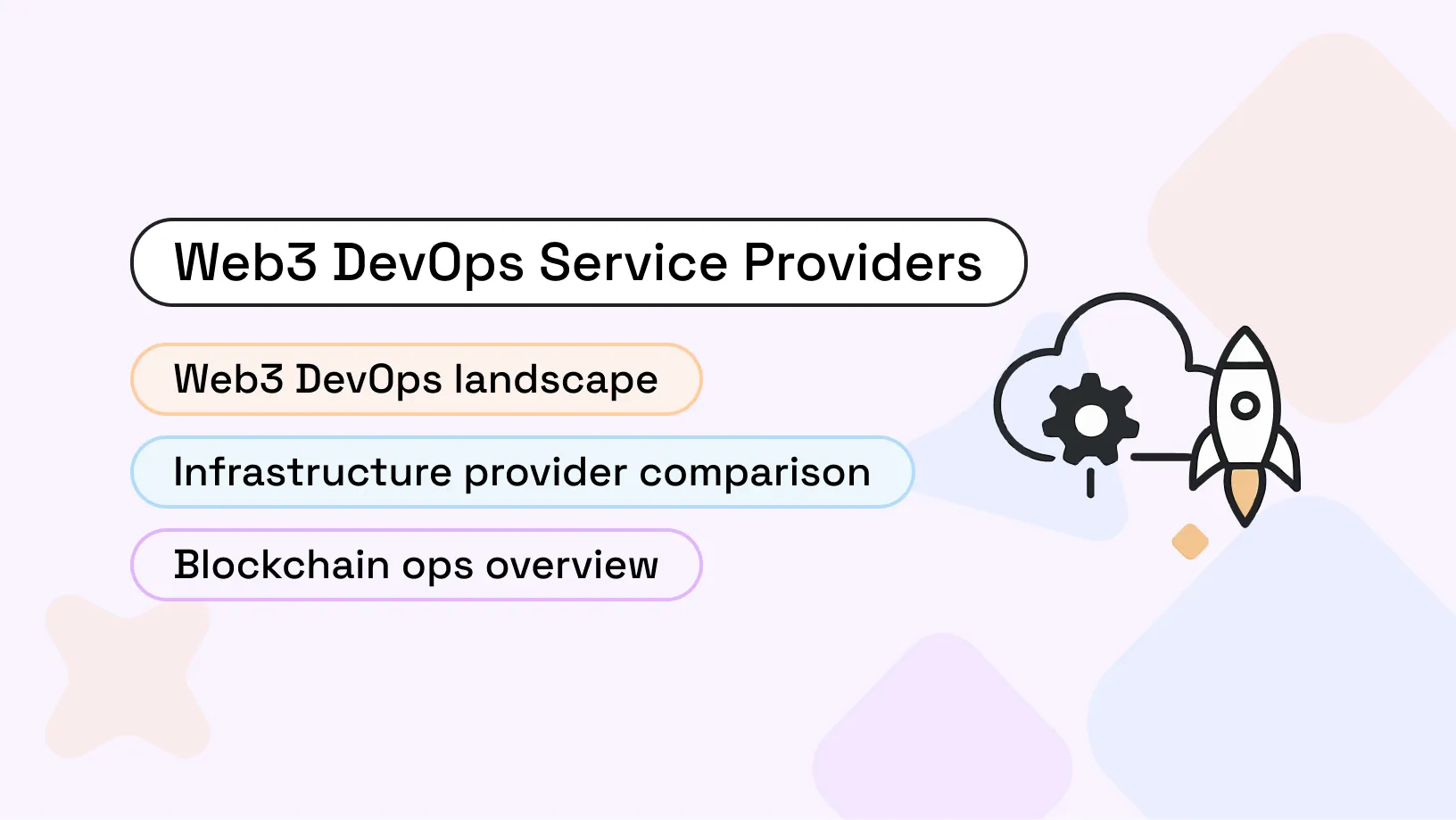
Earlier, we published a deep dive into the top blockchain DevOps companies shaping infrastructure in 2025. But Web3 is evolving fast, and infrastructure needs are evolving with it.
While blockchain was once the technical foundation, Web3 now demands more than just uptime and validator hosting. It needs a flexible, scalable, cross-protocol infrastructure that supports dApps, wallets, rollups, and real-time data pipelines across ecosystems.
And the stakes are only getting higher. The global Web3 market is projected to hit nearly $100 billion by 2034, according to a Precedence Research report. As more projects race to ship faster and scale smarter, demand for advanced Web3 DevOps service providers is surging.
So who’s leading this new wave? Below, we spotlight the top teams building the backend of tomorrow’s decentralized web.
Web3 DevOps? That’s the part no one talks about
In Web2, DevOps focused on automating deployments, managing servers, and keeping systems online. In Web3, engineers deal with validator nodes, coordinate between networks, and deploy smart contracts across multiple chains. A bug in production can freeze assets, block transactions, or break critical parts of the protocol.
That’s where Web3 DevOps services come in.
These are companies that provide engineering support across the entire blockchain deployment lifecycle, from CI/CD pipelines for smart contracts to monitoring validator uptime, managing multi-cloud environments, autoscaling RPC endpoints, and optimizing infrastructure costs through FinOps. Their role is to help Web3 teams ship fast, stay online, and scale without burning resources or making critical mistakes in live environments.
Here are the core components typically handled by Web3 DevOps providers:
- CI/CD pipelines: Automating testing, audit integration, and deployment for smart contracts and backend services.
- Infrastructure as Code (IaC): Provisioning blockchain infrastructure using tools like Terraform and Helm for consistency and repeatability.
- Kubernetes & Container orchestration: Managing dynamic workloads across chains and regions, often with auto-recovery and scaling.
- Monitoring & Alerting: Real-time dashboards using Prometheus, Grafana, Loki, bridge/sequencer-specific monitoring, cross-chain incident response, and custom alert logic for uptime-critical components like nodes or bridges.
- FinOps: Cost visibility and optimization across AWS, GCP, Azure, and on-prem setups—essential in long-running blockchain workloads.
- SRE & Incident management: Web3 DevOps in 2026 borrows heavily from SRE playbooks: error budgets for RPC latency, clearly defined SLAs for validator uptime, and incident response runbooks for bridge outages, sequencer stalls, or DA provider issues.
Leading DevOps providers now offer on-call rotations, incident postmortems, and chaos testing tailored for decentralized systems.
- Security hardening & Access control: Role-based access, secure secrets management, and network policy design for decentralized environments.
- Disaster recovery & Backup: Redundant node clusters, auto-failover, and snapshot systems to recover quickly from failures or attacks based on SLAs.
In 2025-2026, Web3 teams are launching faster and dealing with more complex infrastructure than ever. DevOps covers everything from automated deployments and cloud scaling to monitoring nodes and keeping the validator uptime high.
But what has changed for the industry in 2026?
What changed in 2026 for Web3 DevOps
In 2026, Web3 infrastructure is shifting from single-chain deployments to modular stacks and rollup-centric architectures. DevOps teams now routinely operate:
- L2 and L3 rollups with their own sequencers and data availability layers;
- Shared sequencer networks that must hit strict latency and MEV policies;
- Modular stacks (execution + DA + settlement) that span multiple providers.
This raises new expectations for Web3 DevOps providers: beyond node uptime, they’re now responsible for latency-sensitive ordering, cross-domain messaging reliability, and upgrade-safe rollup orchestration.
Top Web3 DevOps service providers in 2026
So, we’ve reviewed dozens of teams and selected 7 trusted Web3 DevOps service providers based on factors like performance, scalability, uptime, developer tools, and adaptability to complex Web3 environments.
Here are the factors we looked at the most:
Each provider brings something different to the table. Whether you're running a DeFi protocol, launching a Layer 2 network, or building a cross-chain tool, there's a team here that fits your needs.
A friendly reminder: Check the details of the providers’ description at the moment of your own research!
The one to watch first: Dysnix
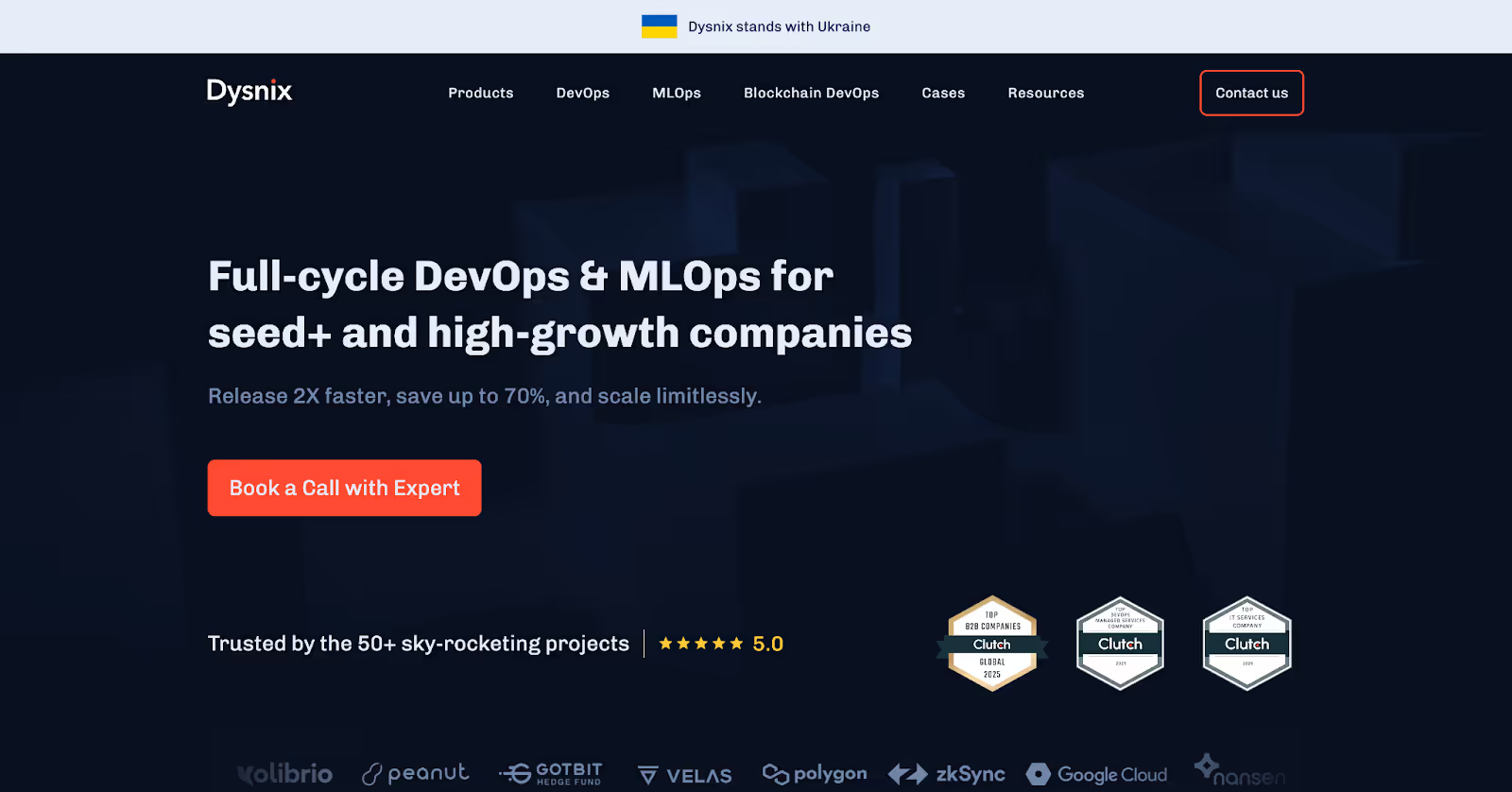
Out of all the Web3 DevOps providers we’ve looked at, Dysnix comes in with the most versatile and proven portfolio.
Dysnix is a top-rated Web3 DevOps service provider trusted by 50+ high-growth projects for fast, scalable, and cost-efficient infrastructure. While others specialize in narrow use cases or specific chains, Dysnix delivers full-cycle DevOps and MLOps tailored for both early-stage startups and scaling enterprises. They provide everything from infrastructure design and predictive autoscaling to validator hosting and cross-chain deployment—all under one roof.
What makes Dysnix different is their breadth of real-world experience. Their portfolio includes Tier-1 projects like zkSync, PancakeSwap, Polygon, Nansen, and even R&D-heavy cases like Kolibrio, where they built a secure simulation system with sub-1ms performance across Ethereum, BNB Chain, and Polygon. Whether you need to launch fast, scale globally, or solve deep performance bottlenecks, their team has been there and delivered.
Their infrastructure is cloud-agnostic, battle-tested under high loads, and tailored to meet strict performance and security standards. At the same time, they offer flexible engagement models, from cost-efficient setups for lean teams to enterprise-grade solutions with architectural consulting and 24/7 support.
Pros:
- One of the most diverse Web3 DevOps portfolios in the market with successful deployments across DeFi, R&D, and MedTech.
- Offers both foundational infrastructure and advanced services like predictive scaling and AI-based autoscaling.
- Full integration support, minimal vendor lock-in, and a true extension of in-house engineering.
- Trusted by Tier-1 teams and proven in high-load environments like PancakeSwap (100K+ RPS).
Cons:
- Due to high demand, onboarding may require a short wait or project review queue.
Protofire
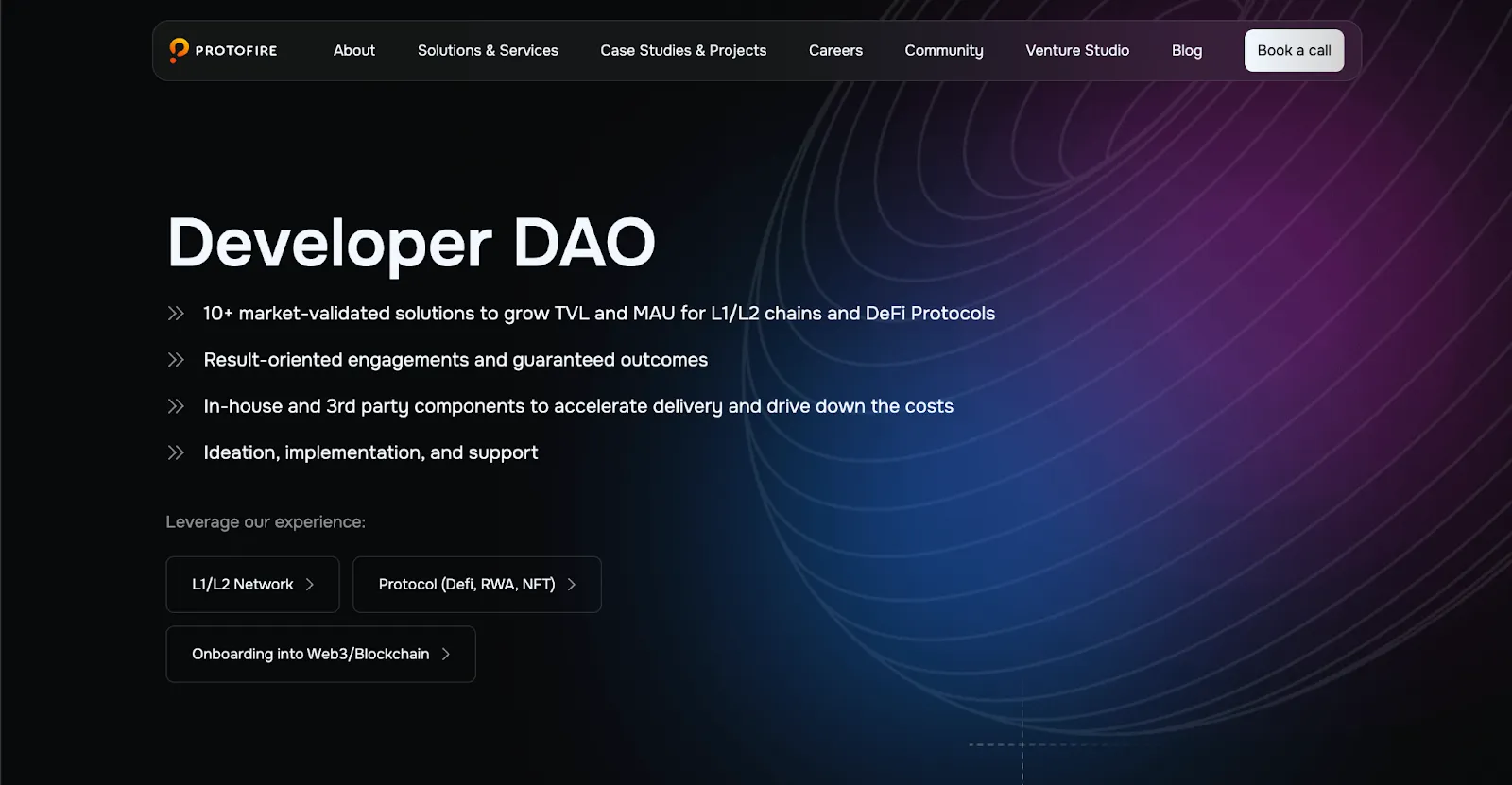
Protofire is a specialized DevOps provider focused on Web3 infrastructure, with a track record supporting high-impact blockchain protocols like The Graph, POA Network, Gnosis, and Chainlink. Based in Argentina, the team offers DevOps-as-a-Service for projects that need infrastructure automation, validator operations, and seamless testnet/mainnet deployment. They work closely with blockchain foundations, ecosystem grants, and Web3 startups that require fast, secure, and reproducible environments.
Their Web3 DevOps offering includes CI/CD pipelines, infrastructure-as-code using Terraform, node deployment, monitoring stacks (Grafana/Prometheus), and security-focused configuration management. Protofire also supports testnet orchestration, relayer management, and upgrade pipelines, which are especially valuable for developer tools, L2s, or oracle services. Clients benefit from a transparent delivery process, documentation, and hands-on support throughout the deployment lifecycle.
Protofire doesn't publish public pricing, as most projects receive customized DevOps plans based on chain complexity and resource needs. However, as many of their clients are grant-funded or early-stage, the team is known for offering flexible engagement terms and milestone-based pricing.
Pros:
- Strong experience with protocol-level DevOps for foundational Web3 tools (The Graph, Chainlink);
- Offers full-cycle CI/CD, testnet setup, infrastructure-as-code, and advanced monitoring;
- Ideal for grant-funded or open-source-focused Web3 teams.
Cons:
- No fixed pricing or self-serve model—engagement usually requires a technical discovery phase;
- Focused more on protocol infrastructure than end-user dApp scaling.
Inc4
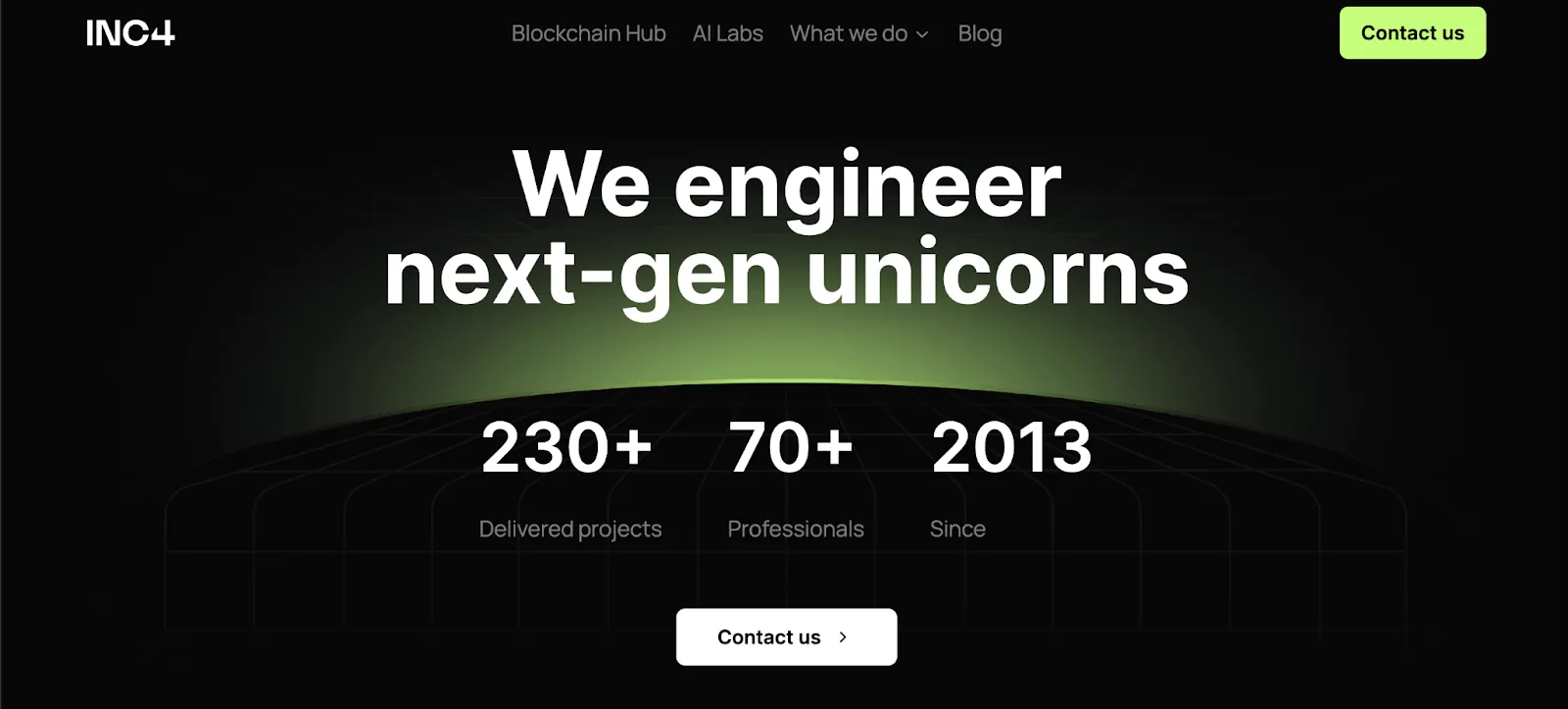
INC4 is a Ukraine-based Web3 development company offering a strong DevOps division focused on blockchain infrastructure engineering. The team works with startups and scaling projects to automate deployment pipelines, optimize cloud environments, and ensure high uptime for decentralized applications. INC4’s DevOps service covers both backend infrastructure and blockchain-specific layers, making them a flexible choice for projects running on EVM-compatible chains and beyond.
Their Web3 DevOps offering includes CI/CD automation, cloud orchestration using AWS and GCP, containerization with Docker and Kubernetes, and real-time monitoring and alerting setups. They also help with smart contract testing automation, staging-to-production rollouts, and infrastructure audits. INC4 positions itself as a full-cycle partner, meaning they can take projects from MVP to production-ready architecture with embedded DevOps pipelines and on-demand support.
Pricing is not standardized, but INC4 typically works on monthly retainers or project-based scopes. They are flexible enough to support both smaller Web3 teams looking to establish foundational automation and mature protocols needing cost optimization and stability upgrades.
Pros:
- Offers flexible DevOps support from MVP to production with full cloud and container stack coverage;
- Combines blockchain expertise with modern DevOps tools (Terraform, Docker, Kubernetes, Prometheus);
- Suitable for growing startups with hybrid Dev/DevOps workflows.
Cons:
- Less known outside the Eastern European region;
- Might not be the fastest option for urgent launch timelines due to custom onboarding.
Quema
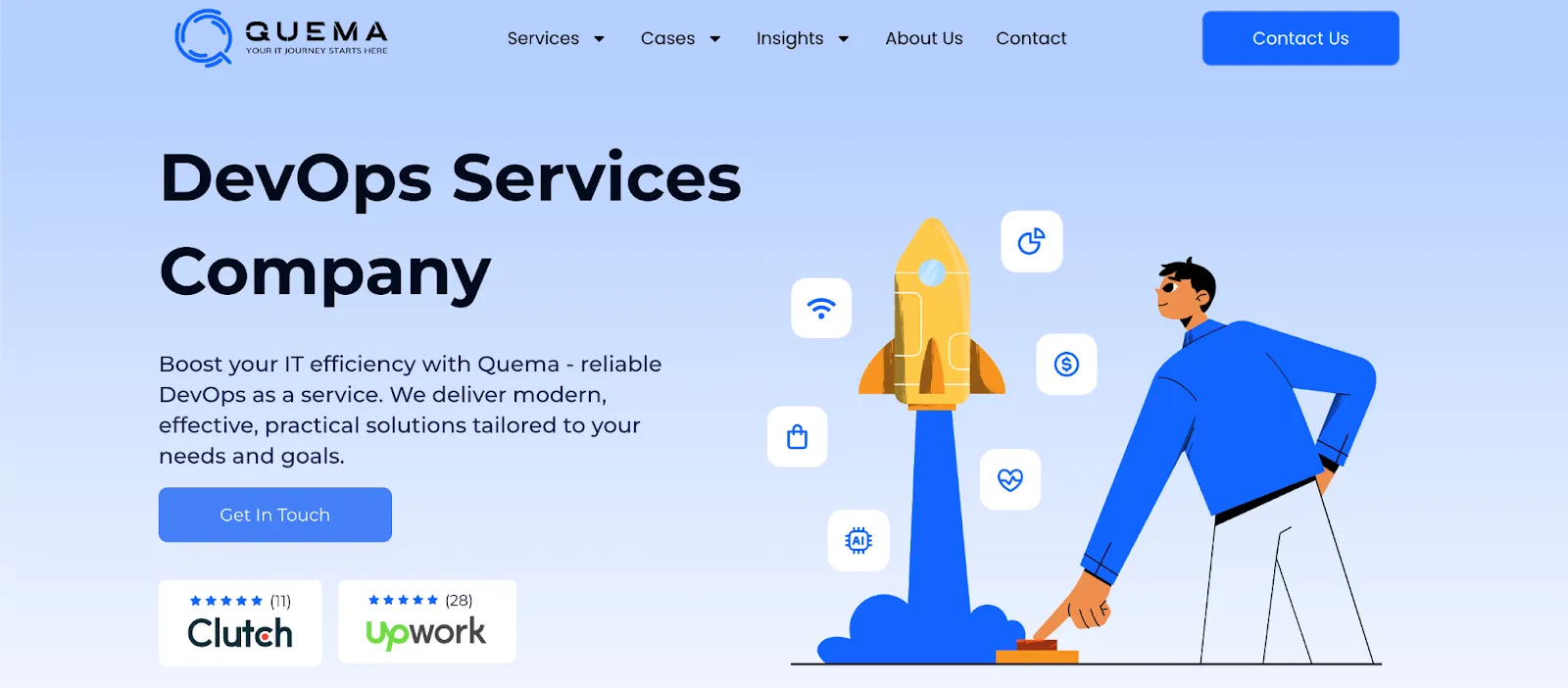
Quema is a Web3-native DevOps and infrastructure engineering company based in Argentina, specializing in blockchain IT infrastructure services. They focus on delivering reliable backend systems for Web3 startups and dApps, with a strong emphasis on Kubernetes-based deployment, observability, and continuous delivery. Quema serves projects in DeFi, GameFi, and Layer-1/Layer-2 ecosystems, offering long-term support and infrastructure automation from day one.
Their DevOps services include node deployment and maintenance, GitOps pipelines using ArgoCD, Helm-based infrastructure templates, monitoring and alerting with Grafana/Prometheus, and high-availability setups for blockchain environments. Quema helps Web3 teams implement CI/CD, auto-scaling clusters, custom telemetry, and real-time dashboards to track system health, making them a strong choice for applications that require 24/7 uptime and performance tracking.
Pros:
- Deep focus on Kubernetes, GitOps, and blockchain node orchestration;
- Strong monitoring and observability tooling for Web3 backends;
- Works well with fast-moving dApps and applications that require real-time infrastructure visibility.
Cons:
- Best suited for technically mature teams—limited educational support for non-technical founders;
- Public visibility and brand presence still growing outside the LATAM region.
Gart Solutions
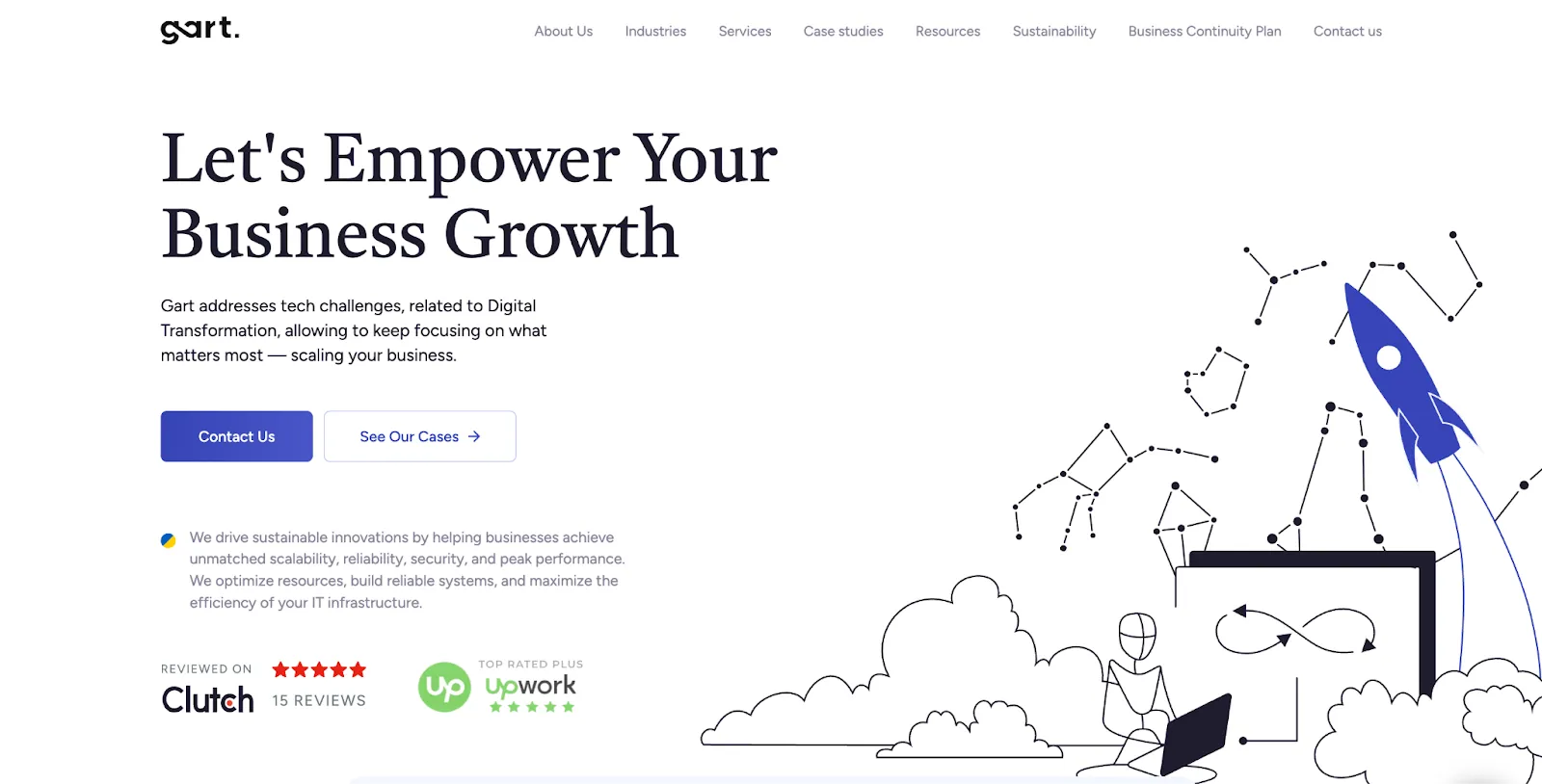
Gart Solutions is a DevOps and cloud engineering company that has expanded its expertise into Web3 DevOps services, focusing on infrastructure automation, security, and high-availability environments for blockchain projects. Headquartered in Eastern Europe, the company supports Web3 teams by delivering DevOps-as-a-Service across decentralized networks, validator systems, and smart contract pipelines.
Gart’s Web3 DevOps offering includes CI/CD pipeline setup, Kubernetes orchestration, infrastructure-as-code with Terraform, and real-time observability through Prometheus and Grafana. They also assist with load testing, zero-downtime deployments, cloud resource optimization, and secure access policies—all essential components for maintaining blockchain infrastructure in production. Their services are modular, making it easy to plug in at any stage of a project, whether it's launching a testnet, preparing for mainnet, or stabilizing a growing app.
Pros:
- Offers a full DevOps toolkit, from CI/CD to secure cloud infrastructure, tailored for Web3 environments;
- Strong focus on observability, alerting, and security hardening for production-grade blockchain apps;
- Good option for mid-sized teams scaling validator clusters or managing multicloud Web3 workloads.
Cons:
- Limited exposure to Tier-1 protocols or high-traffic DeFi ecosystems;
- Requires an in-house technical point of contact to integrate effectively.
CoinFabrik
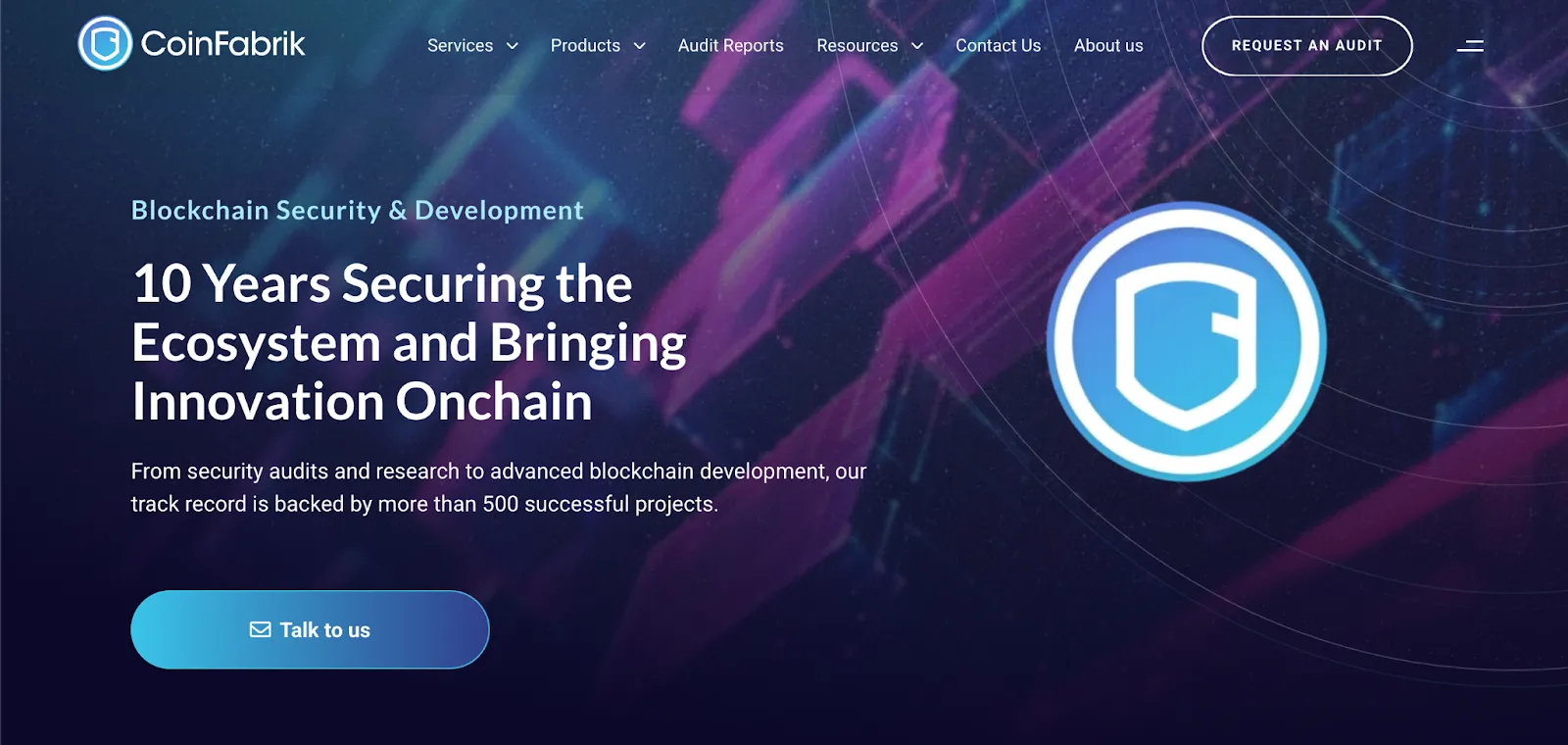
CoinFabrik is a seasoned blockchain development company based in Argentina, offering specialized Web3 DevOps services for teams building decentralized infrastructure. With over a decade of experience in security, smart contract development, and backend architecture, CoinFabrik delivers infrastructure that’s robust, secure, and production-ready. Their DevOps team focuses on automating smart contract pipelines, deploying and monitoring nodes, and orchestrating scalable blockchain environments.
Their service portfolio includes CI/CD for dApps and smart contracts, containerized node infrastructure using Docker and Kubernetes, real-time monitoring via Prometheus and Grafana, and infrastructure audits to ensure system health and security. CoinFabrik also supports testing environments, relayer integrations, and upgrade strategies, especially valuable for protocol-level teams and fintech applications.
Pros:
- Strong focus on security and performance in blockchain environments;
- Offers CI/CD, infrastructure audits, and smart contract deployment automation;
- Trusted by enterprise and fintech clients for stable, long-term infrastructure.
Cons:
- Less emphasis on cloud-native scalability compared to DevOps-first firms;
- May not be the best fit for fast-scaling dApps or gaming platforms with real-time loads.
IT Outposts
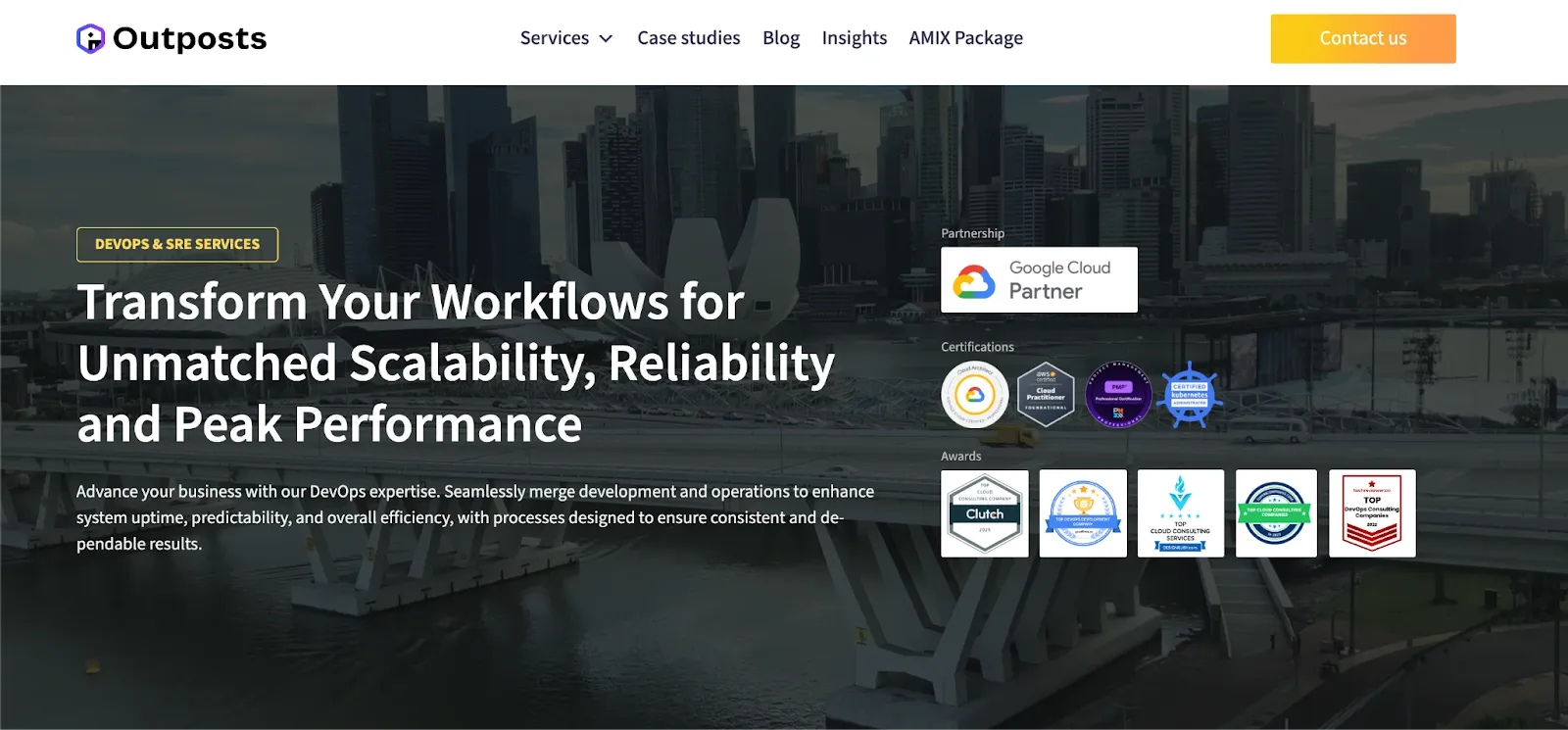
IT Outposts is a Cyprus-based DevOps company that extends its services into Web3 infrastructure with a focus on rapid DevOps implementation, CI/CD automation, and cost-efficient cloud scaling. While not blockchain-native at its core, the company has adapted well to the demands of decentralized systems, helping early-stage projects and startups automate deployments and maintain backend stability.
Their Web3 DevOps services include CI/CD pipelines, infrastructure containerization, cloud infrastructure audits, monitoring setups, and deployment optimization for various blockchain-based backends. They work with AWS, GCP, Azure, and integrate standard tools like Jenkins, Docker, Terraform, and Kubernetes to create flexible and efficient environments.
Pros:
- Quick onboarding and strong support for early-stage teams;
- Offers reliable CI/CD, monitoring, and infrastructure consulting tailored to budget-sensitive projects;
- Works with multicloud and hybrid setups to match evolving architecture needs.
Cons:
- Less experience with high-load Web3 apps or protocol-level infrastructure;
- Lacks native tooling for blockchain-specific components like node ops or oracles.
Service comparison of the Web3 DevOps providers
In 2026, teams choosing a Web3 DevOps partner care more about how each provider handles rollups, modular stacks, real-world SRE, and onboarding friction. The table below gives a quick 2026 snapshot of where each provider from this list tends to fit best.
*These two columns extrapolate from the current descriptions to 2026-style architectures (rollups, modular stacks, SRE/SLAs). Please verify and adjust based on each provider’s latest public capabilities.
TL;DR
- If you’re running high-load DeFi, L2/L3, or HFT-style systems, Dysnix is the most natural first shortlist due to its track record with Tier‑1, performance-critical projects.
- If you’re building protocol-level tooling or working via grants and foundations, Protofire and CoinFabrik tend to align better with governance-heavy, security-focused environments.
- If you want end-to-end product development plus DevOps, INC4 is a good fit for startups that need both application and infrastructure help under one roof.
- If your team is already technically mature and wants strong observability and GitOps, Quema and Gart stand out for Kubernetes, monitoring, and multi-cloud production setups.
- If you’re early-stage and cost-sensitive, IT Outposts offers fast, standardized DevOps bootstrapping that can later be hardened or extended as your Web3 stack matures.
How to pick a Web3 DevOps provider in 2026
In 2026, three factors matter more than ever:
- Architecture: Are you running a single-chain dApp, a custom rollup, or a modular stack (execution, DA, settlement)? Shortlist providers who’ve shipped in your exact topology.
- Latency & throughput: If you’re in DeFi, HFT, or gaming, ask for concrete numbers: max RPS handled in production, typical p95 latency, and incident history.
- Governance & upgrades: For protocols and rollups, verify how they handle chain upgrades, governance-driven changes, and multi-tenant environments (shared sequencer or DA).
- Risk & compliance: If you touch fiat on/off-ramps or regulated markets, check for security certifications, data residency options, and incident response maturity.
Map these against your project stage—MVP, pre-mainnet, or scaling globally—and you’ll quickly see which of the providers from this list is a realistic fit.
So, who’s building your backend?
Selecting a Web3 DevOps provider comes down to your project’s scale, technical needs, and growth plans. Startups may prioritize flexibility and support, while enterprises often need battle-tested infrastructure, security standards, and performance under pressure.
Look for a team that aligns with your tech stack, understands your roadmap, and can adapt as you scale. Don't just evaluate based on pricing or chain support: check case studies, uptime guarantees, and how fast they can respond when things break.
If you’re looking for a provider that covers all bases, from MVP launch to full-scale deployment, Dysnix stands out as a TOP Web3 DevOps service provider. Their real-world experience, custom engineering, and Tier-1 track record make them a solid choice for teams that want to build right from day one.

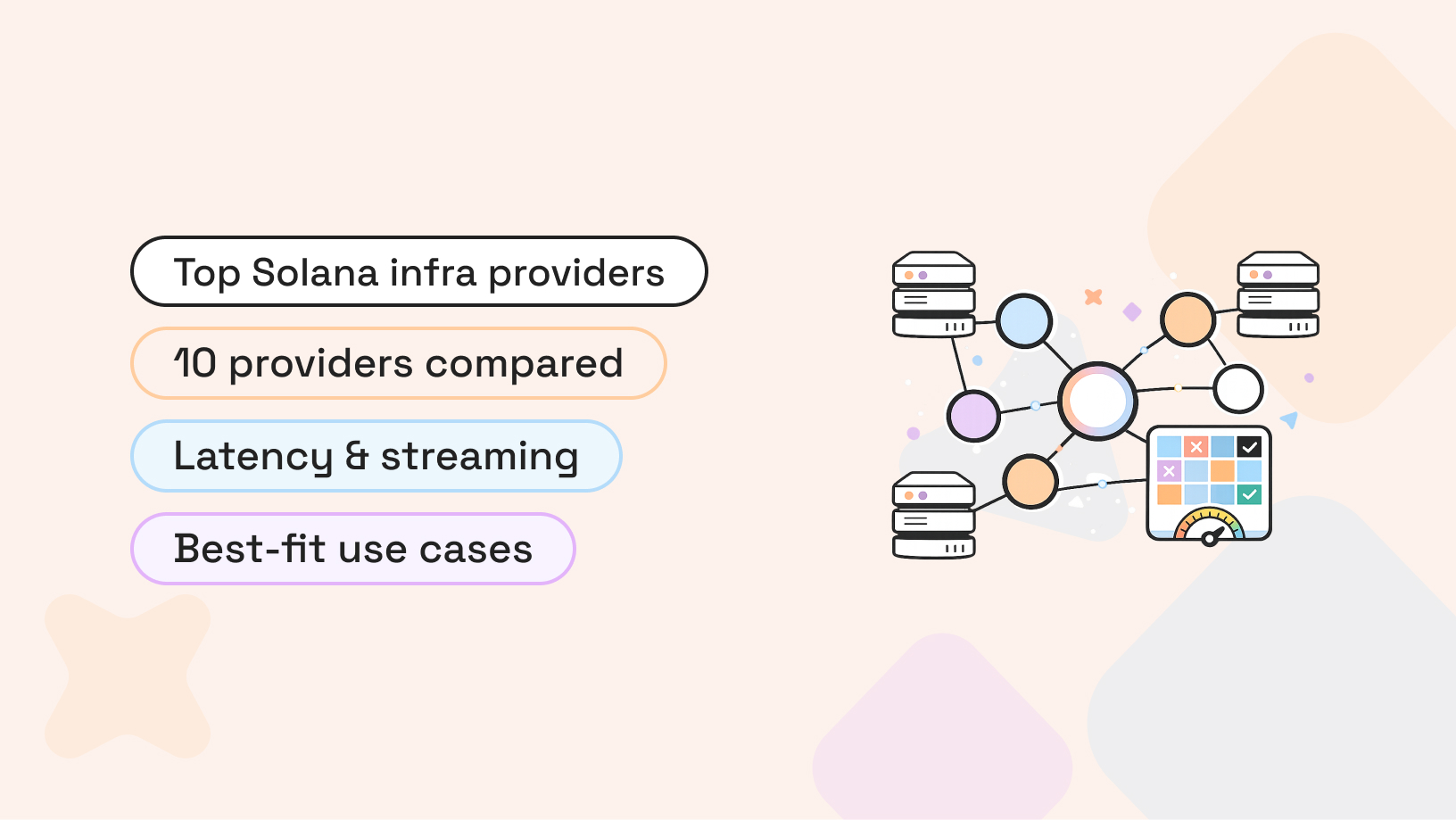



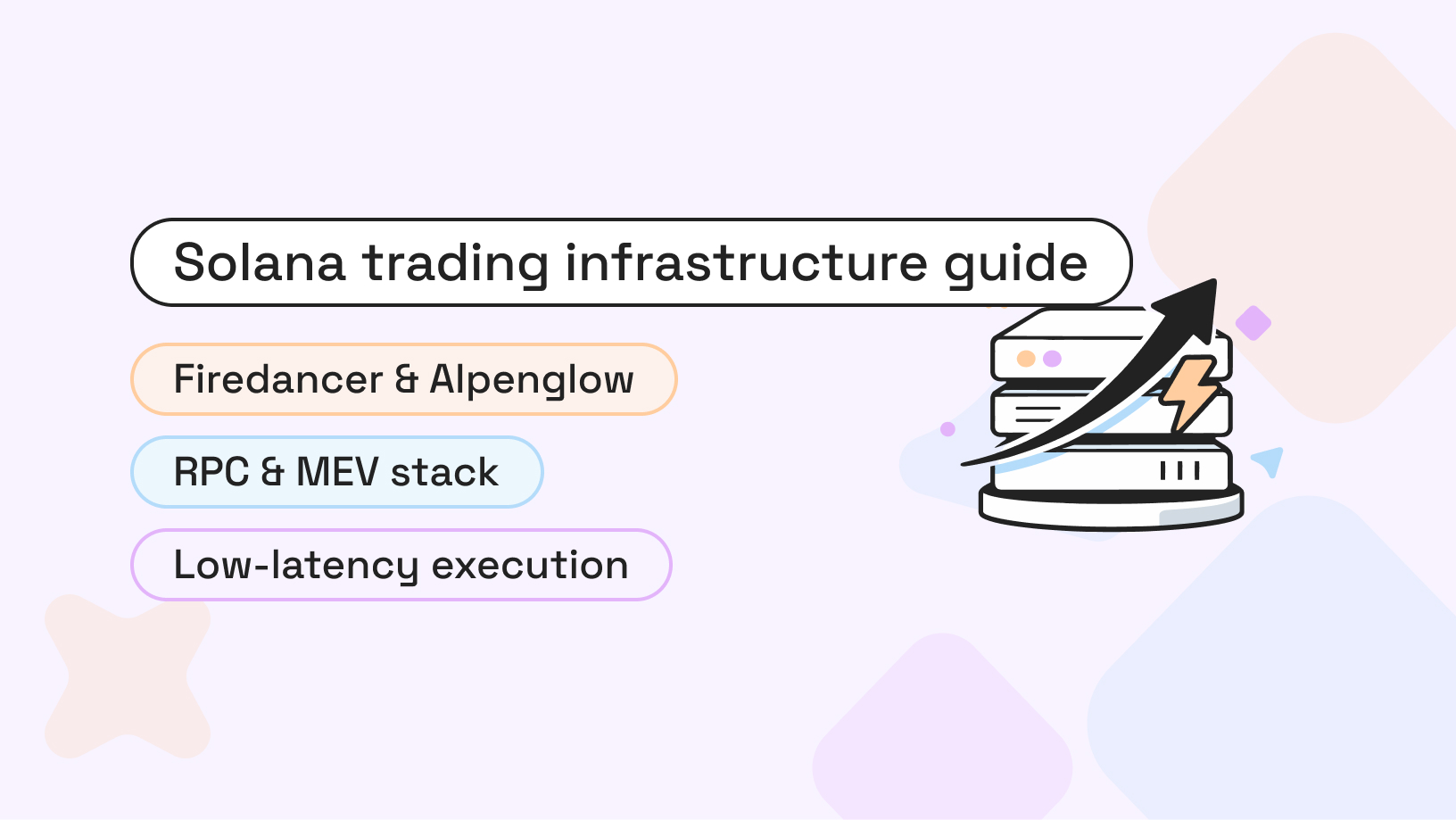













.svg)
.svg)
.svg)

